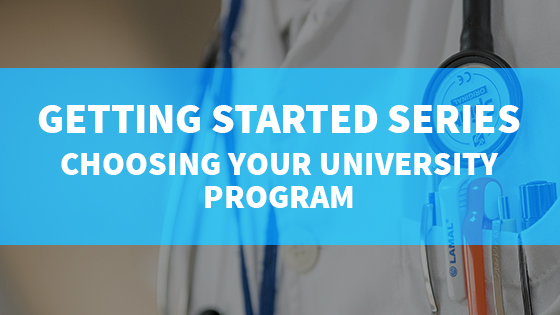
Getting Started Series (Part 3): Choosing your University Program
When it comes to applying for medical school, the first important decision you make is where you choose to do undergrad. Because where you do undergrad and what program you choose dictates much of your premed experience – what grades you can get, what research opportunities are available, and what ECs or volunteer work are in your local environment.
Basically what we are saying is to take your time choosing your undergrad program and choose wisely. It’s common for students to simplify the process of picking their undergrad. For example, “I like engineering and I like the city of Toronto, so I’ll go to UofT for engineering”. Maybe that works for some career paths, but for medical school, there are many more factors to think about. In this section we will highlight those factors, and help you reflect on making one of the most important decisions if your life so far, especially if you want to do medicine someday.
Location
Undergrad is a big jump from high school. Where you spend your time outside of class and the enjoyment you derive from it will directly impact your success in the classroom. Is being close to family important to you? Does the city your university is in have the right facilities and activities to keep you happy? Maybe you don’t want to live with your family, but you want to see them once a week – is travelling back feasible?
Some people advocate going somewhere farther away to get a “new experience” and acquire “independence”. Other students are more comfortable being close to their family, especially if family is particularly important to them. There is no right way to go about it. The important thing is figuring out what your priorities are and what environment you need to keep yourself happy, so you can succeed academically and in preparing for medical school.
Program
What exactly will you be studying in university? When it comes to medical school, there are generally two streams of thought at the opposite ends of the spectrum: 1.) Pick the program you think you will get the best grades in; or 2.) Pick the program you think you would enjoy the most. Of course, sometimes you can satisfy both aspects with the same program, in which case you should definitely pick that program. Quite commonly, the program you are most interested in is also the one where you’d get the best marks, and leads to a job you would be willing to do if medicine does not work out.
Sometimes it’s not so easy. You might really enjoy engineering, but you also hear engineering is notorious for being very difficult and hard to get good grades in. Again, there is no right answer to picking your program. All we can do is educate you on the options and what to think about.
Think about whether you can get enough grades to make medicine a possibility in the future. Think about whether you can maintain your sanity in the program and find interest in it. Think about whether the program will lead to alternative careers you would be happy with if you do not end up in medicine. Think about these factors, weigh how important each one is for you, and use that to make your decision for what program.
Don’t fall into the trap of thinking that the Life Sciences program at one university is the same as the Life Sciences program at another. More likely than not, they are similar but not identical. Read through the required courses for each program – you’d be surprised, but sometimes you can like one program at one university but not at another, despite the programs sharing the same name. So make sure you survey the courses at each university, and see which one appeals to you.
Extra-Curricular & Volunteer Work
It’s important to scout out opportunities available to you outside academics. Does the university have the clubs or sports teams you enjoy? If you want to volunteer at a hospital while living on campus, is there one close by? Smaller universities tend to have fewer choices and variety of clubs or student groups, but that can also mean more opportunity and less competition for leadership roles.
Another important idea to consider is whether there are any ECs or volunteer work you want to continue from high school. Perhaps you are the leader of a local club or have worked your way up through a volunteer position, and want to continue doing so in university – if this is that important to you, perhaps you should go to a university close to home.
Research
Many premeds are interested in trying out research. Again, the same issues go for research as ECs – larger institutions might have more funding with greater variety of research and a larger number of well known scientists, but smaller universities may have less competition and more opportunity for students interested in getting their feet wet in research. Again, you need to prioritize what is important for you.
What Medical Schools Think
Of course, the one factor high school students interested in medical school worry about the most is: do medical schools care that I went to university X or took program Y?
The truth is, no medical school explicitly admits that where you attend university matters. If they truly adhere to that philosophy, then no, it doesn’t matter where you go. In our medical school classes, we see students from every university out there, both large and small, well known and less well known.
There is no Right Answer
At the end of the day, you need to think about all these factors and pick the university and program that is best for your situation. Our goal is to make you aware of these factors, and hope you spend time reflecting on them. If you do that, then we are confident you will make a good decision in selecting your university program.





